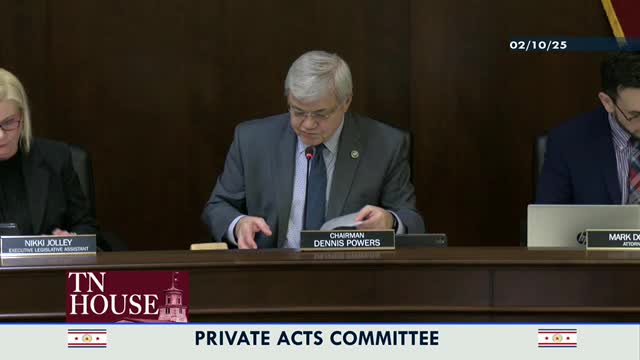Panel tells committee private acts fill local gaps, require local ratification
Get AI-powered insights, summaries, and transcripts
Subscribe
Summary
A panel of local-government representatives told the House Private Acts Committee that private acts remain important tools for Tennessee counties and many cities to set local structures, taxes and offices; presenters reviewed the history, common uses, and the constitutional ratification requirement.
A three-member panel briefed the House Private Acts Committee on how private acts operate in Tennessee and where local governments still rely on them.
Will Denami of Denami Government Affairs, David Connor of the Tennessee County Services Association and Chad Jenkins of the Tennessee Municipal League described private acts as a longstanding, county- and city-level mechanism that can "fill in the blanks" where general law is silent and, in some cases, provide authority or structure beyond general law. "Private acts are a little bit of a strange animal in the state," Connor told the committee.
The presenters outlined common private-act uses: establishing the organization or selection method for county highway departments or road superintendents, setting office terms for county attorneys or other local officials, and authorizing local taxes historically handled by private acts (wheel taxes, hotel-motel taxes, and development or adequate-facilities taxes). Jenkins said private-act charters are still common: "There are 212 [private-act cities], so that's about 60% of the cities are private act," and he noted that cities incorporated after the 1953 constitutional change must use a general-law charter.
Panelists emphasized the constitutional safeguard that private acts affecting only one jurisdiction require local approval. Connor described the usual practice: legislators carrying a private act for a city or county generally request a resolution or ordinance from the local governing body showing two-thirds support before filing, and the constitution requires ratification either by a two-thirds vote of the governing body or by referendum. The panel also noted that the secretary of state's office tracks ratification and that, absent a date set in the measure, a default ratification deadline of Dec. 1 applies.
Committee members asked how localities that are covered by a general-law charter (post-1953 incorporations) accomplish unique local changes; Jenkins explained that such changes are typically sought through general law of local application (e.g., population brackets) rather than private acts. Connor gave concrete examples of where private acts still matter for counties: whether a county highway chief is elected or appointed, creation of road commissions in some counties, and legacy taxes enacted under private acts.
The committee thanked the presenters; no legislation was taken at the briefing.
